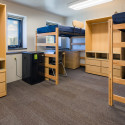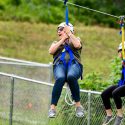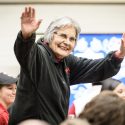Campus FAQ: Hosting events featuring political candidates
Visits from local, state and national political candidates can enhance the educational experience by engaging students on public affairs. Academic departments and Registered Student Organizations (RSOs) may, under certain circumstances, host events featuring political candidates on campus. Those wishing to host such events should be aware of laws and campus policies (particularly Facility Use Policy P6) that must be followed as well as resources available to assist in organizing a successful event.
These events have the potential to draw a large crowd and involve significant operational and security logistics that require advanced planning. They may also result in disruption of classroom instruction, research and university administrative business.
Depending upon the type of event in which they participate, candidates may be limited in the number of appearances they can make on campus under Facility Use Policy P6. It’s important for the university to apply its policies fairly and consistently to all candidates. In order to do so, university officials need to be aware of the types of events that are being hosted. Below are questions to consider and steps to take as you plan your event.
Classroom visits
Instructors may invite political candidates to a class, provided the visit is for a demonstrable educational purpose related to the class in question and does not include campaign activity (e.g., signing up volunteers, handing out campaign material). Such visits are not subject to the limitation on the number of visits set out in Facility Use Policy P6. When possible, instructors are encouraged to invite other candidates in that election to provide equal time.
All other events
Q – Is this event intended for the campus community only or for the general public (including news media)?
This is important to determine early on.
- Campus community only – Registered student organizations (RSOs) may only use university facilities for events that are primarily for students, faculty, and staff. All publicity for these events must state that attendance is limited to students, faculty and staff and is not open to the public. RSOs can host political candidates an unlimited number of times as long as attendance is limited to students, faculty and staff.
- Open to the general public/news media – If an RSO wishes to host an event open to the general public and/or news media, the RSO must obtain a departmental sponsor (for example, the Department of Political Science or the Center for the Study of Liberal Democracy).Events that are sponsored by academic units may be open to the general public and/or news media if the sponsor chooses. If the event is open to the public/news media, the organizer must notify UWPD and University Communications and, if an RSO, the Center for Leadership and Involvement.
Q – Is the speaker a declared candidate for office?
If yes, the requirements for political events in Facility Use Policy P6 apply.
RSOs that wish to hold a political event must contact the Center for Leadership and Involvement.
Q – What if the speaker is not a declared candidate for office or a surrogate?
Then the limit on the number of visits does not apply. However, if the speaker is likely to draw a crowd (more than 50 people), notify UWPD and University Communications and see the final section below for factors you should consider in organizing the event.
Q – What are the limits on the number of candidate appearances?
Under Facility Use Policy P6, each candidate or their surrogate (a person affiliated with the candidate who is engaging in campaign activity on the candidate’s behalf) may appear at a public event on campus once during the primary election and once during the general election. In addition, political parties engaging in campaign activity may hold one public event on campus for state-level candidates and one for national-level candidates during the primary election and again during the general election.
Please note that these limits do not apply to events that are hosted by RSOs where attendance is limited to students, faculty and staff or to debates featuring multiple candidates.
Q – What if it’s only a small event with a short speech and questions from students?
The size and duration of the event does not matter. If the invited guest is a declared candidate for any office or their surrogate, the policies and limits apply. This includes, but is not limited to, a presentation, meet ‘n greet, speech, question and answer session, debate, or public forum featuring candidates for public office or political campaign issues.
Q – Is this a debate or forum involving multiple candidates?
All legally qualified candidates must be invited and given an equal opportunity to speak and participate. Permissible activities include speeches, question-and-answer sessions, debates, or similar activities. A statement should be given that the university does not endorse nor oppose any of the candidates.
Q – What campus spaces can an RSO reserve for a political event?
The spaces that can be reserved can be found here and the rules for using university facilities for political purposes must be followed. All events are subject to a security and logistics assessment and may be required to relocate or reschedule to ensure an appropriate space.
Q – Can an RSO or academic unit host a fundraiser for the candidate on campus?
No. Any event that asks for a contribution to a candidate or political party is prohibited on campus by state law.
Q – Can an RSO or academic department use a university logo on flyers and social media posts to promote the event?
Yes. Any publicity about the event must also clearly note the name(s) of the sponsor(s) of the event. Political candidates and campaign organizations may not use logos or other university marks.
Q – Can an RSO or academic unit use a picture of Bucky Badger or the Motion W to promote the event?
No. These are spirit/athletic symbols and not appropriate for academic or related activities.
Q – Is the event likely to draw a crowd (more than 50 people)?
If so, then you’ll want to consider several factors, including:
- Minimum turnaround time for planning an event with a large crowd
- Crowd estimate and room capacity required
- Should you reserve an overflow room?
- Will you need a separate space for a meet and greet before or after the event?
- How will you control attendance to avoid exceeding room capacity – for example, will free tickets be issued?
- Security questions – contact UWPD
- Number of volunteers needed to staff the event
- Audiovisual needs (including livestreaming)
- Media/communications plan – contact University Communications
- Putting together a detailed “Run of Show” outlining the full event
- Possibility of disruption and how to handle it – contact UWPD and the Dean of Students Office
Q – Where can RSOs go for more help and information?
The Center for Leadership and Involvement is available to help RSOs in their efforts to develop informed voters and encourage civic engagement.



